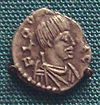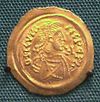- Desiderius
-
For other people named Desiderius, see Desiderius (given name).
Desiderius (also known as Daufer or Dauferius; Didier in French and Desiderio in Italian) was the last king of the Lombard Kingdom of northern Italy (died c. 786). He is chiefly known for his connection to Charlemagne, who married his daughter and conquered his realm.
Contents
Rise to power
Desiderius Romae was originally a royal officer, the dux Langobardorum et comes stabuli, "constable and duke of the Lombards," an office apparently similar to the contemporaneous Frankish office of dux Francorum. King Aistulf made him duke of Istria and Tuscany and he became king after the death of Aistulf in 756. At that time, Aistulf's predecessor, Ratchis, left his monastic retreat of Montecassino and tried to seize the kingdom, but Desiderius put his revolt down quickly with the support of Pope Stephen II. At his coronation, Desiderius promised to restore many lost papal towns to the Holy See, in return for the papacy's endorsement of his claim. Conflict with the Holy See under Pope Stephen III arose, for Stephen opposed Charlemagne's marriage to Desiderius' daughter. Desiderius ceased delivery of the towns after only a few.
Seeking, like his predecessors, to extend the Lombard power in Italy, he came into collision with the papacy and the southern duchies. In the same year Desiderius associates to his kingdom the son Adelchis. Alboin, the duchy of Benevento and Liutprand, that of Spoleto were coaxed by Pope Stephen to commend themselves to the Franks and thus separate themselves again from monarchy. They then [1] placed themselves under the protection of Pippin (Lat. Pipinus), the king of Franks. In 758, Duke Liutprand of Benevento attained his majority and rebelled. Desiderius defeated him and granted his duchy to one Arechis, tying the duchy more closely to Pavia than it had been since Grimoald's time. In that same year, Desiderius deposed Alboin of Spoleto and exercised himself the ducal powers there.
Appointing Antipope Phillip
Desiderius seized a priest named Phillip from the Monastery of St Vito. One July 31, 768 he summarily appointed him pope. Antipope Philip was never recognized nor gained a significant following so he left the same day and returned to his monastery where he was never heard from or seen again.[2]
Relations with Charlemagne
Stephen III opposed Charlemagne's marriage to Desiderius' daughter, Desiderata, in 768, but by his death in 772, he had made peace with the Lombards. The new pope, Adrian I, however, implored the aid of Charlemagne against him, for the marriage of dynasties was dissolved by Charlemagne's repudiation of Desiderata in 771. Charles sent her back to her father. Moreover, Gerberga, the widow of Charlemagne's brother Carloman, sought the protection of the Lombard king after her husband's death in 771; and — probably in return for the insult Charlemagne had given to the Lombards by rejecting Desiderata — Desiderius recognised Gerberga's sons as lawful heirs, and attacked Pope Adrian for refusing to crown them kings and invaded the Pentapolis. The embassies of Adrian and Desiderius met at Thionville and Charlemagne favoured the pope's case.
Such was the position when Charlemagne and his uncle Bernard led troops across the Alps in 773. The Lombards were severely defeated at Mortara (Ara Mortis) and soon besieged in their capital of Ticinum, the modern Pavia. Desiderius' son Adelchis was raising an army at Verona, but the young prince was chased to the Adriatic littoral and fled to Constantinople when Charlemagne approached.
The siege lasted until June 774, when, in return for the lives of his soldiers and subjects, Desiderius surrendered and opened the gates. Desiderius was exiled to the abbey of Corbie, where he died, and his son Adelchis spent his entire life in futile attempts to recover his father's kingdom. Some sources state that the king and his family were banished to a monastery at Liège, Belgium. Desiderius died sometime around 786.
The name Desiderius appears in the romances of the Carolingian period. Charlemagne took the title rex Langobardorum, the first time a Germanic king adopted the title of a kingdom he had conquered.
Family
He married Ansa (or Ansia) and, as well as a son, had four daughters:
- Anselperga (or Anselberga), abbess of San Salvatore
- Adelperga (or Adelberga), married Arechis II of Benevento
- Liutperga (also Liutpirc or Liutberga), married Tassilo III of Bavaria
- Desiderata, married Charlemagne in 770, divorced in 771
- Adelchis (or Adalgis), patrician in Constantinople
References
Regnal titles Preceded by
AistulfKing of the Lombards
756–774Succeeded by
CharlemagnePreceded by
AlboinDuke of Spoleto
758–759Succeeded by
GisulfKings of Italy between 476 and 963 Non-dynastic Odoacer (476–493)Ostrogoths Byzantines Justinian I (as Emperor) (553–565)Lombards Alboin (565–572) · Cleph (572–574) · Interregnum (574–584) · Authari (584–590) · Agilulf (590–616) · Adaloald (616–626) · Arioald (626–636) · Rothari (636-652) · Rodoald (652–653) · Aripert I (653–661) · Godepert (661–662) · Perctarit (661–662) · Grimoald (662–671) · Garibald (671) · Perctarit (671–688) · Cunipert (688–689) · Alahis (689) · Cunipert (689–700) · Liutpert (700–702) · Raginpert (701) · Aripert II (702–712) · Ansprand (712) · Liutprand (712–744) · Hildeprand (744) · Ratchis (744–749) · Aistulf (749–756) · Desiderius (756–774)Carolingians Charles I (774–814) · Pepin (781–810) · Bernard (810–818) · Lothair I (818–855) · Louis I (855–875) · Charles II (875–877) · Carloman (877–879) · Charles III (879–887) · Arnulf (896–899) · Ratold (896)Non-dynastic
(title disputed 887–933)Unruochings: Berengar I (887–924) · Guideschi: Guy (889–894) · Lambert (891–897) · Welfs: Rudolph (922–933) · Bosonids: Louis II (900–905) · Hugh (926–947) · Lothair II (945–950) · Anscarids: Berengar II (950–963) · Adalbert (950–963)Categories:- 8th-century births
- 786 deaths
- Lombards
- Lombard kings
- Dukes of Spoleto
- 8th-century Italian people
- 8th-century rulers in Europe
Wikimedia Foundation. 2010.



